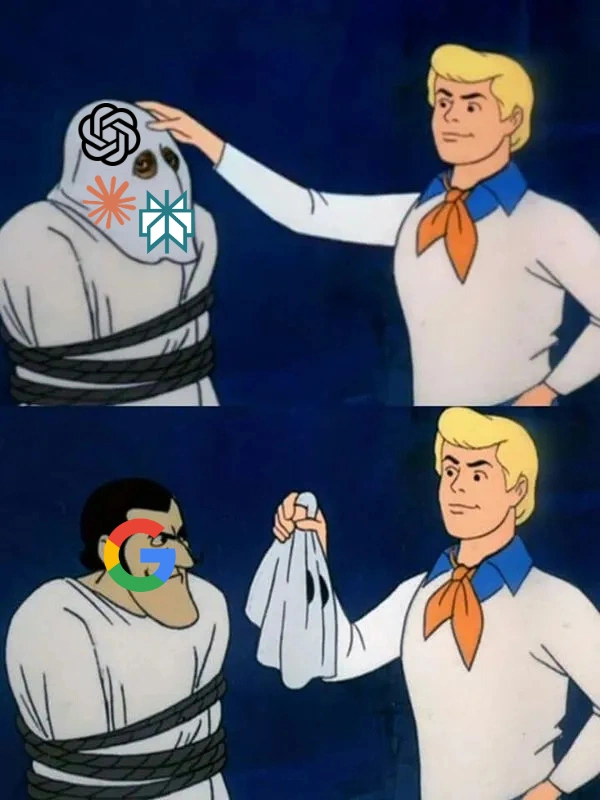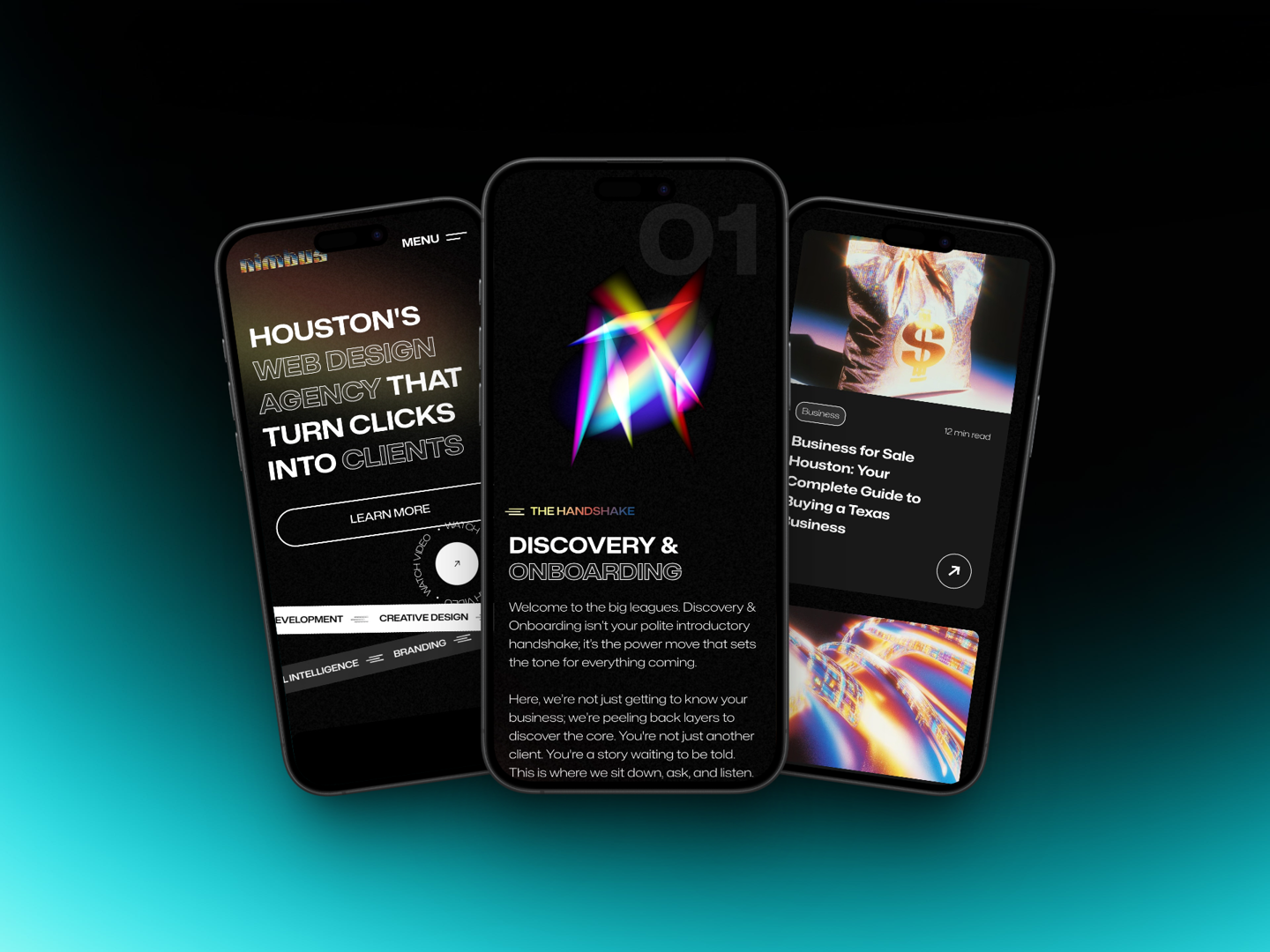Did AI Kill SEO? Here's What We Think

The State of SEO for Houston Businesses
Quick Answer: SEO remains highly effective in 2025. Google processes over 5 trillion searches annually. The top organic result captures 39.8% of clicks. AI Overviews appear in only 13.14% of searches, primarily for informational queries rather than commercial intent keywords that drive Houston business growth.
The SEO world shifted dramatically when Google rolled out AI Overviews across search results. Houston business owners watched their analytics dashboards with concern. Traffic patterns changed. New competitors appeared in search results. The question spread through networking events and board meetings: is SEO dead?
Here's the reality.
SEO isn't dead. It transformed into something more sophisticated and creative. The global SEO services market reached $81.46 billion in 2024 and continues growing at 13.24% annually. Houston businesses that adapt their organic strategies are capturing more qualified leads than ever before. Those clinging to outdated tactics are losing ground.
Let's break it down.
Search behavior tells the real story. Houston residents conduct millions of local searches monthly. They search for contractors, restaurants, medical services, and professional services. These commercial-intent searches rarely trigger AI Overviews. Traditional organic results still dominate where it matters most for revenue generation.
The numbers prove SEO's continued value. Research from 2024 shows 91% of businesses reported positive SEO impact on their marketing goals. Organic search drives approximately 33% of total website traffic across industries. For Houston service businesses, that percentage often reaches 50% or higher.

What Changed and What Didn't
Google's algorithm evolved significantly. Machine learning systems like RankBrain and BERT now understand context and user intent better than keyword matching alone. Also, Google's new patent MUVERA is their newest algorithm that reportedly speeds up retrieval and ranking with improved accuracy, you can read about it here. The March 2024 Core Algorithm Update integrated the Helpful Content System directly into the main algorithm. These changes reward businesses that create genuinely useful content rather than keyword-stuffed pages.
Mobile-first indexing became the standard. According to Exploding Topics, over 64% of users access the internet through mobile devices. Google now primarily uses mobile versions of websites to determine rankings. Houston businesses without responsive, fast-loading mobile sites face significant disadvantages.
Core Web Vitals emerged as ranking factors. These metrics measure real user experience through loading speed, interactivity, and visual stability. Websites must achieve specific thresholds: Largest Contentful Paint under 2.5 seconds, First Input Delay under 100 milliseconds, and Cumulative Layout Shift below 0.1.

AI's Real Impact on Organic Search
AI transformed search, but not how doomsday predictions suggested. AI Overviews appear at the top of some search results, providing synthesized answers from multiple sources. The key word: some. Analysis reveals AI Overviews trigger for only 13.14% of searches. Most commercial searches that Houston businesses target remain unaffected.
It's almost like SEO professionals are the most equipped people in the world to help companies navigate AI search but hey what do I know -Lily Ray
Understanding which searches trigger AI Overviews helps refine strategy. Informational queries like "how does HVAC work" often generate AI responses. Transactional queries like "HVAC repair Houston" typically don't. Local service searches, product comparisons, and buying-intent keywords still display traditional organic results where clicks convert to customers.
Voice search growth requires attention. Approximately 20% of Google App searches now use voice commands. Voice queries use natural language patterns. Instead of typing "pizza Houston," users ask "where's the best pizza near me?" Content optimization must accommodate these conversational patterns while maintaining keyword relevance.

Zero-Click Searches: Challenge or Opportunity?
Zero-click searches increased to nearly 60% of all Google searches. Users find answers directly in search results without clicking through to websites. This trend concerns many Houston business owners watching traffic metrics.
The complete picture reveals opportunities within this challenge. Featured snippets achieve 42.9% click-through rates when users need more information. Knowledge panels build brand awareness even without clicks. Local pack listings drive foot traffic and phone calls tracked separately from website visits. If you're a local business, focus on local queries and optimize for your service areas.
Strategic adaptation turns zero-click searches into wins. Optimize for featured snippets by providing clear, concise answers to common questions. Build comprehensive Google Business Profiles that convert searchers directly from results pages. Create content that earns knowledge panel inclusion to establish authority. This might also sound confusing and out-of-reach, but we can assure you that it's not.
The Houston Local SEO Advantage
Local SEO presents massive opportunities for Houston businesses. The city's 2.39 million residents generate millions of "near me" searches monthly. Competition exists, but strategic local optimization captures significant market share.
Google Business Profile optimization drives immediate results. Complete profiles with accurate hours, services, photos, and regular posts appear prominently in local packs. Verified businesses with active review management see 7x more clicks than incomplete profiles.
Local citations build geographic relevance. Consistent NAP (name, address, phone) information across directories signals legitimacy to search engines. Houston-specific directories like the Greater Houston Partnership and local chambers provide valuable local signals.
The beauty of SEO is that, instead of pushing a marketing message onto folks who don’t want to hear what you have to say, you can reverse-engineer the process to discover exactly what people are looking for, create the right content for it, and appear before them at exactly the moment they are looking for it. It’s pull vs push. -Cyrus Shepard
Neighborhood-level targeting captures hyper-local searches. Optimizing for "Memorial area dentist" or "Heights restaurant" targets specific Houston communities. Creating location-specific pages for multi-location businesses or service areas improves relevance for neighborhood searches. Remember, treat your website as a database- not a brochure.
Building Your 2025 SEO Strategy
Success requires strategic evolution, not abandonment. Houston businesses must adapt their SEO approach to current realities while maintaining proven fundamentals. Also, you need to have these conversations with your SEO agency to make sure they are up-to-date on these new trends.
GEO/AEO: Real or Hype?

While many SEO agencies are quick to shill GEO/AEO services or whatever other clever acronyms they come up with- it's important to understand that the fundamentals of the game haven't changed. ALL of LLM's out there: ChatGPT, Perplexity, Claude and others are largely parasitic on Google's search index. To be clear: they are scraping Google. Technical SEO's have been providing the proof for months now.
The questions for business owners is: should I prioritize GEO/AEO over SEO in my budget? What exactly is my SEO agency doing to generate more visibility in LLM output? Are the results as valuable? How much of this is fluff and hype-base obfuscation meant to push expensive upsells? In our opinion, you should be diligent to ask these questions and write down the specific answers your agency provides.
Many of the same faces who are now pushing this stuff were just selling n8n automations a few months ago. We've noticed all of this and you should too.
It’s almost like Search and LLMs have many different use cases, and have this whole time. -Lily Ray
Technical Foundation Requirements
Technical SEO forms the foundation for all other optimization efforts. Without proper technical implementation, even exceptional content struggles to rank.
Site speed optimization reduces bounce rates and improves rankings. Implement image compression, minify code, leverage browser caching, and use content delivery networks. Target Core Web Vitals benchmarks to meet Google's user experience standards.
Mobile optimization goes beyond responsive design. Test touch targets, eliminate horizontal scrolling, optimize fonts for readability, and ensure fast mobile loading speeds. Remember: Google indexes mobile versions first.
Site architecture guides both users and crawlers. Maintain flat hierarchies keeping pages within three clicks of the homepage. Create logical URL structures, comprehensive XML sitemaps, and strategic internal linking patterns.
Security builds trust and rankings. HTTPS encryption is mandatory. Implement security headers, regular vulnerability scanning, and maintain updated certificates across all domains and subdomains.
It's important to look beyond rankings and rather ensure a website is usable for everyone. - Ruth Everett

Content Strategy That Converts
Content is what the search engines use to fulfill user intent. - Dave Davies
Content quality trumps quantity in 2025's SEO landscape. Google's algorithms identify and reward expertise, authority, and trustworthiness (E-A-T).
Topic clusters establish authority. Instead of targeting individual keywords, create comprehensive content covering entire topics. A Houston HVAC company might build a cluster around "indoor air quality" with interconnected articles on filtration, humidity control, ventilation, and maintenance.
User intent alignment drives engagement. Understand whether searchers want information, navigation, transactions, or commercial investigation. Match content type to intent: guides for information, comparison charts for commercial investigation, clear CTAs for transactional queries.
Focus on searcher intent. This should underpin all of your activities—research, creation and distribution. What is the searcher really trying to achieve and how is your content helping them reach this goal? -Simon Ensor
Information gain provides competitive advantage. Analyze top-ranking competitors, identify content gaps, then create superior resources. Add original data, case studies, expert interviews, or unique perspectives competitors miss.
Regular updates maintain relevance. Google favors fresh, accurate content. Schedule reviews of cornerstone content quarterly. Update statistics, refresh examples, and expand sections based on new developments.
Ensure you're writing content the way that you'd explain it to someone over the phone -Carolyn Lyden, Lead SEO at Search Hermit

Link Building Without Penalties
Quality links remain crucial ranking factors. However, link building tactics evolved significantly from past practices.
Backlinks are the cornerstones of website authority and credibility in the eyes of search engines - Backlinko
Digital PR earns natural links. Create newsworthy content like original research, industry surveys, or expert commentary on current events. Houston media outlets actively seek local business perspectives on economic trends, industry developments, and community issues- become their source for insights.
Strategic partnerships build relevant links. Collaborate with complementary Houston businesses on content, events, or community initiatives. A web design agency like us might partner with local marketing consultants for co-created resources.
Resource creation attracts links organically. Develop tools, calculators, templates, or comprehensive guides that others naturally reference. Industry-specific resources addressing Houston market conditions prove particularly link-worthy.

Measuring What Matters
SEO success metrics evolved beyond keyword rankings and traffic volume. Modern measurement focuses on business impact and user engagement.
Qualified traffic matters more than volume. Track conversion rates, engagement metrics, and lead quality from organic search. High-intent traffic converting at 5% proves more valuable than high-volume traffic converting at 0.5%.
The goal is not to rank #1, the goal is to generate leads and sales for your business.
Revenue attribution demonstrates ROI. Connect organic search touchpoints to actual sales using analytics tools and CRM integration. Track assisted conversions where SEO contributes to multi-channel customer journeys.
Brand visibility impacts extend beyond clicks. Monitor brand search volume, featured snippet ownership, and knowledge panel presence. These signals indicate growing authority even when direct clicks fluctuate.
Competitive positioning reveals opportunities. Track share of voice for target keywords, comparative Domain Authority growth, and relative content gap analysis. Understanding competitive dynamics informs strategic priorities.

Investment Decisions for Houston Businesses
SEO investment decisions require understanding costs, timelines, and expected returns specific to Houston's market dynamics.
Pricing Realities
Houston SEO services reflect market maturity and competition levels. Entry-level packages ($750-$1,500 monthly) cover basic local optimization and maintenance. Standard packages ($1,500-$2,500 monthly) add content strategy, technical improvements, and basic link building. Comprehensive programs ($3,000-$5,000+ monthly) include aggressive content production, advanced technical optimization, and strategic link acquisition.
Project-based work suits specific needs. One-time technical audits, content pieces, or optimization projects start around $100 for basic deliverables. However, SEO's cumulative nature makes ongoing investment more effective than sporadic projects.
If you have more money than brains, you should focus on outbound marketing. If you have more brains than money, you should focus on inbound marketing. -Guy Kawasaki
Timeline Expectations
SEO remains a long-term strategy. Initial improvements often appear within 3-6 months. Significant ranking improvements typically require 6-12 months. Competitive keywords may take 12-18 months to crack first-page rankings.
Patience pays dividends. Established SEO equity compounds over time. A strong organic presence becomes increasingly difficult for competitors to overcome. Early investment in SEO creates lasting competitive advantages.
ROI Calculations
Calculate SEO ROI using concrete metrics. Determine average customer lifetime value, current conversion rates, and target keyword search volumes. Project conservative traffic increases and conversion improvements to estimate returns.
Consider indirect benefits. SEO improvements enhance user experience, build brand authority, and support other marketing channels. These compounding benefits often exceed direct traffic value.

Common Mistakes Houston Businesses Make
Learning from others' failures accelerates success. These mistakes repeatedly handicap Houston businesses' SEO efforts.
Neglecting Google Business Profile optimization leaves money on the table. Incomplete profiles, inconsistent information, and ignored reviews sabotage local visibility. Active profile management takes minimal time but drives significant results.
Focusing exclusively on homepage optimization limits potential. Inner pages often rank easier for specific queries. Service pages, location pages, and blog content capture long-tail searches that convert better than broad terms.
SEO gets a lot easier when you approach it with the goal of creating the best damn piece of content on the web for a topic. That means putting in the work, understanding people, and legitimately wanting to help them. That means giving up the hacks, the spam, and the corner-cutting. If you want to build something sustainable, you need to build a brand. And you don’t build a brand by cutting corners. -Skylar Reeves, CEO at Ardent Growth
Ignoring mobile experience destroys rankings. Slow mobile loading, difficult navigation, and poor mobile design frustrate users and trigger ranking penalties. Mobile optimization isn't optional when most searches originate from phones.
Chasing shortcuts guarantees penalties. Black-hat tactics like buying links, keyword stuffing, or content spinning trigger algorithmic and manual penalties. Recovery takes longer than proper optimization would have required initially.
Creating content without search intent wastes resources. Publishing content nobody searches for generates no organic value. Keyword research and intent analysis must guide content planning.

FAQ: Your SEO Questions Answered
Is SEO going away?
No. SEO continues evolving but remains essential. Search engines process trillions of queries annually and businesses need optimization to capture that traffic. The methods change; the necessity doesn't.
Is SEO still relevant in 2025?
Absolutely. With 91% of businesses reporting positive SEO impact and the market growing to $171 billion by 2030, SEO's relevance is increasing rather than decreasing.
Can SEO be replaced by AI?
AI enhances rather than replaces SEO. While AI tools assist with content creation and analysis, human strategy, creativity, and local market knowledge remain irreplaceable for effective optimization.
What happens if you stop doing SEO?
Rankings gradually decline as competitors continue optimizing. Fresh content signals disappear. Technical issues accumulate. Eventually, organic traffic drops significantly, requiring substantial effort to recover lost ground.
What is the 80/20 rule for SEO?
Focus 80% of effort on the 20% of activities driving most results. For Houston businesses, this typically means Google Business Profile optimization, core page improvements, and targeting high-intent local keywords.
What is better than SEO?
Nothing replaces SEO entirely. Paid advertising provides faster results but requires continuous investment. Social media builds awareness but rarely drives purchase-intent traffic. Email marketing needs traffic sources to build lists. SEO provides sustainable, compounding returns.

Take Action on Your SEO Strategy
SEO isn't dead. It evolved into a sophisticated discipline requiring strategic thinking, technical excellence, and genuine value creation. Houston businesses that embrace this evolution capture growing organic opportunities. Those waiting for SEO to "die" lose ground to competitors who adapt.
The path forward is clear. Audit your current SEO performance. Identify gaps in technical implementation, content quality, and local optimization. Develop a strategic plan addressing weaknesses while building on strengths.

Your competitors aren't waiting. Every day without proper SEO strategy means lost opportunities to connect with Houston customers searching for your services. The question isn't whether SEO is dead. The question is whether your business will thrive in the evolved search landscape.
Ready to transform your organic search presence? Nimbus Media specializes in SEO strategies designed specifically for Houston businesses. We understand local market dynamics, technical requirements, and content strategies that drive real results. Contact us to discuss how strategic SEO investment can grow your Houston business in 2025 and beyond.
.svg)
.avif)






.webp)